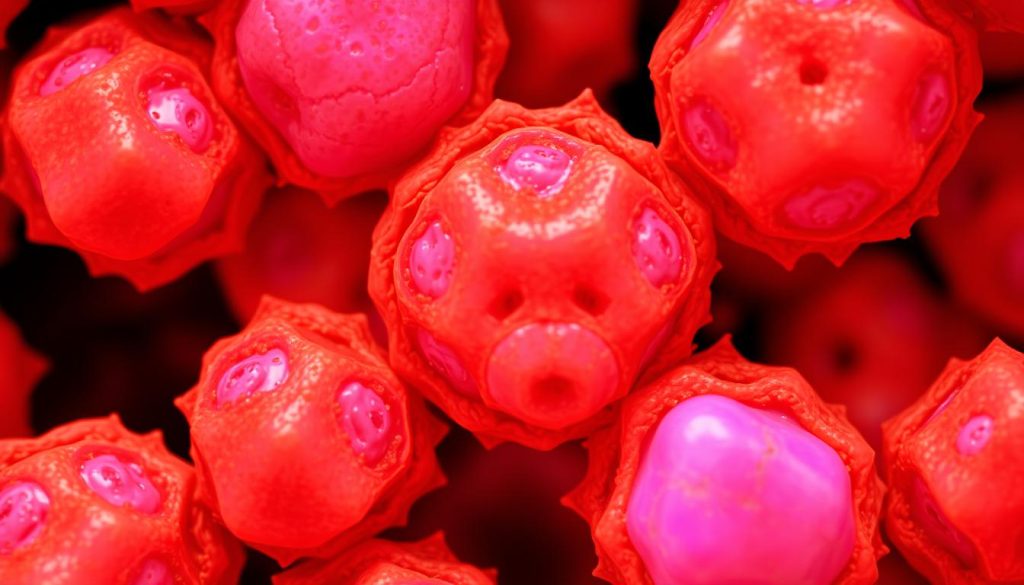Bladder cancer affects thousands of Americans each year. This guide sheds light on the key aspects of this disease. We’ll cover its early warning signs and the latest treatment options.
Recognizing symptoms like hematuria (blood in urine) can lead to timely diagnosis and better outcomes. We’ll explore various diagnostic methods, including cystoscopy. We’ll also discuss treatment approaches from surgery to immunotherapy.
Whether you’re seeking information on bladder cancer risk factors or exploring treatment options, this guide provides valuable insights. Let’s embark on this journey to understand bladder cancer better and explore the pathways to effective care and support.
What is Bladder Cancer and How Does it Develop?
Bladder cancer is a serious condition that affects thousands of Americans each year. To understand this disease, we need to explore the bladder’s structure, types of cancer cells, and how the disease progresses.
The Structure and Function of the Bladder
The bladder is a hollow organ in the pelvis that stores urine. It has a flexible, muscular wall that expands and contracts. The inner lining of the bladder, called the urothelium, is where most bladder cancers start.
Types of Bladder Cancer Cells
The most common form of bladder cancer is transitional cell carcinoma. It accounts for about 95% of cases. This type begins in the urothelium cells that can stretch when the bladder is full and shrink when it’s empty. Other less common types include squamous cell carcinoma and adenocarcinoma.
Cancer Development and Progression Stages
Bladder cancer stages describe how far the cancer has spread. It starts with abnormal cell growth in the urothelium. As it progresses, it can invade deeper layers of the bladder wall and potentially spread to nearby lymph nodes or distant organs. Understanding these stages is key for choosing the best treatment.
- Stage 0: Cancer is only in the bladder’s inner lining
- Stage I: Cancer has grown into the connective tissue
- Stage II: Cancer has spread to the muscle layer
- Stage III: Cancer has reached the fatty tissue outside the bladder
- Stage IV: Cancer has spread to distant parts of the body
Early Warning Signs and Symptoms of Bladder Cancer
Spotting bladder cancer symptoms early is key to effective treatment. Some signs might seem small, but they’re important. Let’s look at the main signs that could mean bladder cancer.
Blood in Urine (Hematuria)
Hematuria is often the first sign of bladder cancer. It can be a light pink or deep red color. Even a single occurrence is a reason to see a doctor. Hematuria might not always mean cancer, but it’s a symptom that needs quick attention.
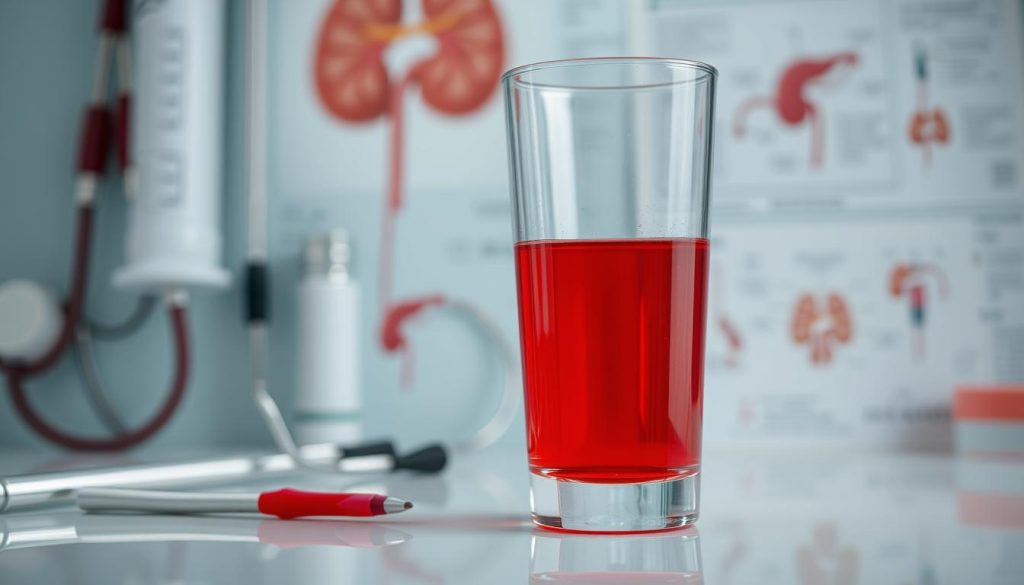
Urinary Changes and Discomfort
Bladder cancer can cause several urinary changes. These include:
- Frequent urination
- Burning sensation while urinating
- Difficulty starting or stopping urine flow
- Weak urine stream
These symptoms might seem like other issues, but if they keep happening, see a doctor.
Advanced Symptom Recognition
As bladder cancer gets worse, more symptoms show up:
- Lower back pain on one side
- Loss of appetite and unexplained weight loss
- Swelling in the feet
- Bone pain
These signs mean bladder cancer is in a more advanced stage. They need quick medical attention.
| Symptom | Early Stage | Advanced Stage |
|---|---|---|
| Hematuria | Yes | Yes |
| Urinary Changes | Yes | Yes |
| Pain | Mild | Severe |
| Weight Loss | Uncommon | Common |
Knowing these symptoms can help find bladder cancer early. If you notice any, like hematuria, get medical help right away.
Risk Factors Contributing to Bladder Cancer Development
It’s important to know about bladder cancer risk factors to prevent and catch it early. Some lifestyle choices and environmental exposures can raise your risk.
Smoking is a big risk factor for bladder cancer. In the U.S., it’s responsible for about half of all cases. The chemicals in cigarettes harm the bladder over time.
Jobs that involve certain chemicals also increase your risk. Workers in rubber, chemical, and leather industries face higher risks. Painters, machinists, and hairdressers are also at higher risk due to their exposure to harmful substances.
- Age: Risk increases with age, with most diagnoses occurring after 70
- Gender: Men are more likely to develop bladder cancer than women
- Race: White individuals have a higher incidence rate
- Family history: Genetic factors can influence risk
Chronic bladder irritation and infections can also lead to cancer. People with long-term catheter use or recurring infections should watch for symptoms. While some risks can’t be avoided, avoiding known carcinogens can lower your risk of bladder cancer.
Understanding Transitional Cell Carcinoma
Transitional cell carcinoma (TCC) is the most common bladder cancer. It starts in the cells lining the bladder. These cells change shape and stretch as the bladder fills and empties. Let’s explore the key aspects of TCC and how it affects treatment decisions.
Characteristics of TCC
TCC has unique features that set it apart from other bladder cancers. It often appears as a growth on the bladder wall. These growths can be flat or raised. TCC can be either non-invasive or invasive. Non-invasive TCC stays in the inner layer of cells. Invasive TCC grows into deeper layers of the bladder wall.
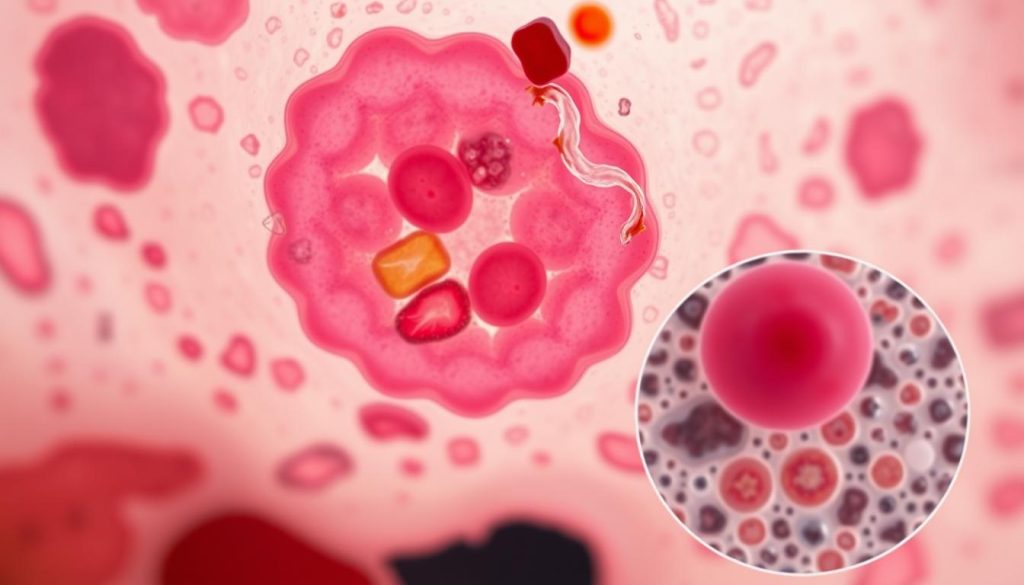
Progression Patterns
TCC progression varies among patients. Some cases grow slowly, while others spread quickly. Factors like tumor grade and stage influence how fast TCC progresses. Early detection of bladder cancer is key for better outcomes. High-grade tumors tend to progress faster and are more likely to invade deeper layers.
Impact on Treatment Choices
The characteristics and progression of TCC greatly affect treatment decisions. Doctors consider several factors:
- Tumor stage and grade
- Extent of bladder wall invasion
- Presence of lymph node involvement
- Patient’s overall health
Treatment options may include surgery, chemotherapy, or immunotherapy. For non-invasive TCC, doctors might recommend bladder-preserving approaches. Invasive TCC often requires more aggressive treatment, such as radical cystectomy.
| TCC Type | Common Treatments | Prognosis |
|---|---|---|
| Non-invasive | TURBT, BCG therapy | Generally good |
| Invasive | Radical cystectomy, chemotherapy | Varies based on stage |
Diagnostic Procedures and Testing Methods
Getting a correct bladder cancer diagnosis needs a mix of tests and procedures. Doctors use different methods to find and confirm cancer cells in the bladder.
Cystoscopy is a key tool in bladder cancer diagnosis. It involves putting a thin tube with a camera into the bladder through the urethra. This lets doctors see the bladder lining for any oddities.
Imaging tests are also key in finding tumors and seeing how far cancer has spread. Common imaging methods include:
- CT scans
- MRI scans
- Ultrasound
Urine tests are often the first step in diagnosing bladder cancer. These tests can spot blood in urine and find cancer cells. A urinalysis can find tiny amounts of blood. Urine cytology looks at cells shed from the bladder wall.
| Diagnostic Method | Purpose | Invasiveness |
|---|---|---|
| Cystoscopy | Visual examination of bladder | Minimally invasive |
| CT Scan | Detailed images of bladder and surrounding tissues | Non-invasive |
| Urine Cytology | Detection of cancerous cells in urine | Non-invasive |
In some cases, doctors might do a biopsy during cystoscopy. This takes tissue samples for more analysis. It helps confirm the diagnosis and figure out the cancer stage. This guides treatment choices.
The Role of Cystoscopy in Bladder Cancer Detection
Cystoscopy is key in finding bladder cancer. It lets doctors see inside the bladder and urethra with a thin camera tube. This helps a lot in spotting bladder cancer.
Procedure Overview
A urologist uses a cystoscope to look inside the bladder. The camera shows images on a screen. This helps find tumors or other signs of bladder cancer.
What to Expect During Testing
Here’s what happens during a cystoscopy:
- The test usually takes 15-30 minutes.
- Local anesthesia makes it less painful.
- You might feel a burning when you pee later.
- You can usually go back to normal activities the same day.
Results Interpretation
After the test, the doctor looks at the results. If they find something odd, they might take a biopsy. The results usually come in a few days. They help figure out if you have bladder cancer and what to do next.
| Cystoscopy Finding | Potential Indication |
|---|---|
| Normal bladder lining | No visible signs of cancer |
| Abnormal growths or lesions | Possible bladder cancer |
| Inflammation or redness | Potential infection or early-stage cancer |
Treatment Options for Bladder Cancer
Bladder cancer treatment depends on the cancer stage and the patient’s health. Doctors use different methods to fight this disease well.
Surgery is often the first choice. For early cancers, doctors might remove tumors through the urethra. For more advanced cases, they might remove the whole bladder.
Radiation therapy kills cancer cells with high-energy beams. It’s used after surgery or for those who can’t have surgery. This treatment can shrink tumors and ease symptoms.
Many patients get a mix of treatments. Let’s compare these options:
| Treatment | Pros | Cons |
|---|---|---|
| Surgery | Removes visible tumors | Risk of complications |
| Radiation Therapy | Non-invasive | May damage healthy tissue |
| Chemotherapy | Targets cancer cells throughout the body | Side effects can be severe |
Your doctor will make a treatment plan just for you. They’ll look at your cancer stage, health, and what you prefer. This helps decide the best treatment for you.
Understanding Radical Cystectomy
Radical cystectomy is a big bladder cancer surgery that takes out the whole bladder and nearby lymph nodes. It’s usually needed for serious bladder cancer. We’ll look at the surgery, recovery, and life changes that come with it.
Surgical Procedures and Techniques
During radical cystectomy, doctors remove the bladder, nearby lymph nodes, and sometimes other organs. They might use open surgery or newer methods like robotic-assisted surgery. The choice depends on the cancer’s stage and the patient’s health.
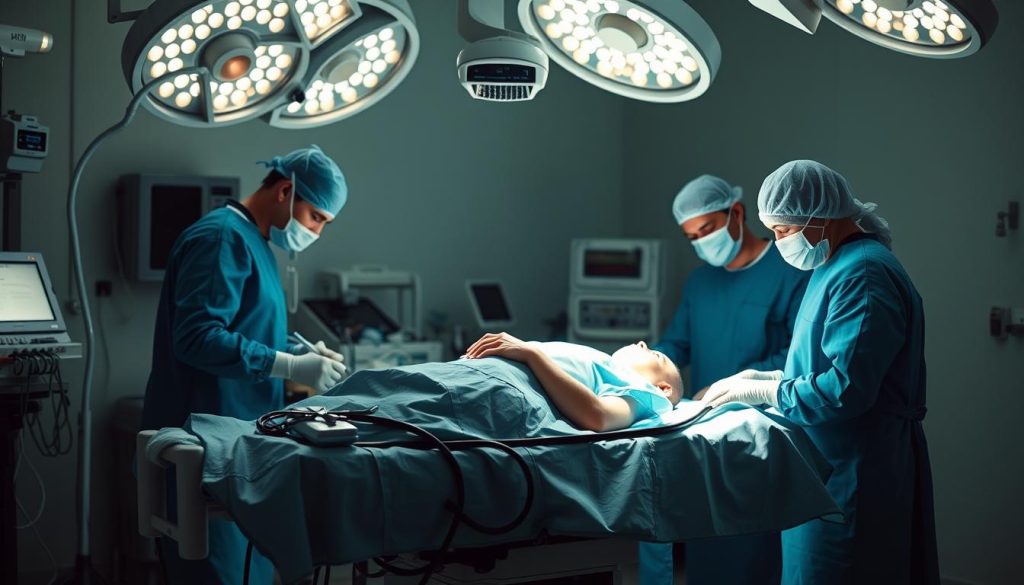
Recovery and Post-Surgery Care
Recovering from radical cystectomy takes time. Patients usually stay in the hospital for 5-7 days after surgery. They learn to manage their new urinary system, which might include an external bag or internal pouch. Physical therapy and slow activity increases help them get stronger. Full recovery can take 6-8 weeks.
Quality of Life Considerations
Life after radical cystectomy changes a lot. Patients get used to new ways of urinating and might face body image challenges. Some also see changes in sexual function. Support groups and counseling help with these changes. Many people find they can get back to normal activities and enjoy life after recovery.
Immunotherapy Approaches for Bladder Cancer
Immunotherapy is a new way to treat bladder cancer. It uses the body’s immune system to fight cancer. This method boosts the body’s defenses to attack cancer cells better than old treatments.
Checkpoint inhibitors are a key part of bladder cancer treatment. These drugs remove barriers that stop immune cells from attacking cancer. This lets the immune system target and destroy cancer cells more easily.
Bacillus Calmette-Guérin (BCG) therapy is another immunotherapy option. It uses weakened bacteria in the bladder to start an immune response. BCG has shown good results in stopping cancer from coming back in some early-stage bladder cancer patients.
Immunotherapy can cause side effects like fatigue, skin rashes, and flu-like symptoms. These side effects are usually milder than those from chemotherapy. Patients should talk to their doctors about the risks and benefits to see if it’s right for them.
Research on immunotherapy is growing, leading to new treatments and combinations. Clinical trials are looking into its use in different bladder cancer stages and with other treatments.
Chemotherapy Protocols and Side Effects
Chemotherapy is key in treating bladder cancer. It uses drugs to kill cancer cells everywhere in the body. We’ll look at the drugs used, managing side effects, and what treatment is like.
Types of Chemotherapy Drugs
Doctors pick from several drugs to fight bladder cancer. Cisplatin, gemcitabine, and methotrexate are common choices. These drugs stop cancer cells from growing and spreading in different ways.
| Drug Name | How It Works | Common Use |
|---|---|---|
| Cisplatin | Damages DNA in cancer cells | First-line treatment |
| Gemcitabine | Interferes with cell division | Often combined with cisplatin |
| Methotrexate | Blocks enzyme needed for cell growth | Used in combination therapies |
Managing Side Effects
Chemotherapy can harm healthy cells too, leading to side effects. You might feel sick, tired, or lose your hair. Your team will help with medicines, diet, and rest to manage these issues.
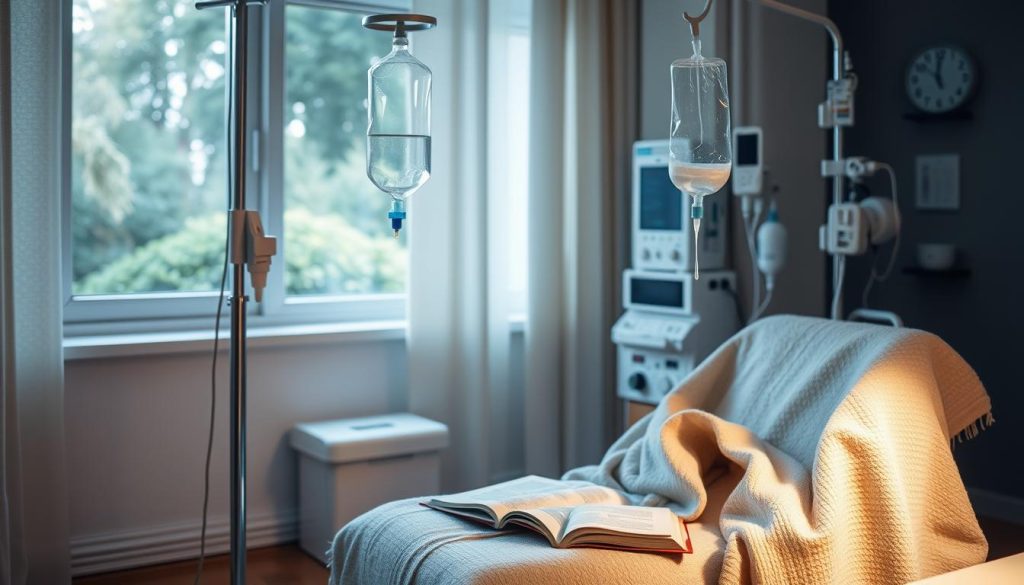
Treatment Schedule and Duration
Chemotherapy for bladder cancer usually follows a cycle. You get drugs for a few days, then rest. This cycle goes on for weeks or months. The exact plan depends on your case and how you react to treatment.
Chemotherapy is a strong weapon against bladder cancer. It may be tough, but many find it worth it. Keep close to your healthcare team during treatment.
Follow-up Care and Monitoring
After bladder cancer treatment, ongoing care is key. Regular visits help catch any signs of recurrence early. Your doctor will make a plan based on your case.
- Cystoscopy exams every 3-6 months for the first 2 years
- Urine tests to check for cancer cells
- Imaging scans to look for spread to other organs
- Blood tests to assess overall health
Preventing cancer recurrence is a big part of follow-up care. Your doctor might suggest lifestyle changes. These could include quitting smoking, staying healthy, and drinking plenty of water.
Knowing the signs of recurrence is important. Early warning signs can lead to quick treatment. Tell your healthcare team about any changes in urination, pain, or blood in urine right away.
Follow-up care is a team effort. Stick to your appointments and talk openly with your doctors. This helps ensure the best outcomes in your cancer journey.
Living with Bladder Cancer: Lifestyle Adjustments
Life with bladder cancer means making changes every day. A good bladder cancer lifestyle includes diet, exercise, and emotional care. These help your body and mind stay strong.
Diet and Nutrition Guidelines
Eating right is key to managing bladder cancer. Eat lots of fruits, veggies, and lean proteins to boost your immune system. Avoid processed foods and drink plenty of water to keep your bladder healthy.

Physical Activity Recommendations
Exercise is important for your overall health and fighting cancer fatigue. Start with easy activities like walking or swimming. As you get stronger, you can do more. Always talk to your doctor before starting a new exercise plan.
Emotional Support and Resources
Dealing with bladder cancer can be tough on your emotions. Reach out to family, friends, or a counselor for support. There are many resources out there, like support groups and online communities, where you can find others who understand what you’re going through.
| Cancer Support Resources | Services Offered |
|---|---|
| American Cancer Society | Information, support groups, financial assistance |
| Bladder Cancer Advocacy Network | Patient education, research updates, online community |
| CancerCare | Counseling, support groups, educational workshops |
Adapting to a bladder cancer lifestyle is a journey. Be kind to yourself and celebrate your small wins. With the right support and resources, you can live well with your condition.
Prevention Strategies and Risk Reduction
Preventing bladder cancer is key. Quitting smoking is the best way to lower your risk. Smoking is linked to half of all bladder cancer cases. If quitting is hard, ask your doctor about help.
Drinking lots of water is also important. It helps remove harmful substances from your bladder. Try to drink at least 8 glasses of water a day. Eating fruits and veggies with antioxidants can also help fight cancer.
Getting regular check-ups is essential. If you’re at high risk because of age, family history, or job, talk to your doctor. They might suggest urine tests or cystoscopies to find problems early.
Also, be careful about chemicals at work. Wear the right gear and follow safety rules. Knowing and avoiding harmful chemicals can help prevent bladder cancer.
FAQ
Q: What are the main symptoms of bladder cancer?
A: Symptoms of bladder cancer include blood in the urine, frequent urination, and painful urination. Lower back pain is also common. These signs can mean other things too, so seeing a doctor is key.
Q: How is bladder cancer diagnosed?
A: Doctors use several ways to find bladder cancer. They might do a cystoscopy, urine tests, and imaging like CT scans. A cystoscopy is often the best way to see if you have bladder cancer.
Q: What are the risk factors for developing bladder cancer?
A: Smoking and being around certain chemicals increase your risk. So does having bladder problems or a family history of cancer. Being older and male also raises your risk.
Q: What is transitional cell carcinoma?
A: Transitional cell carcinoma (TCC) is the most common bladder cancer. It starts in the bladder’s lining. TCC can stay in the bladder or spread deeper, which changes treatment and outlook.
Q: What treatment options are available for bladder cancer?
A: Treatments include surgery, immunotherapy, chemotherapy, and radiation. The right treatment depends on the cancer’s stage and your health. Often, a mix of treatments works best.
Q: How effective is immunotherapy for bladder cancer?
A: Immunotherapy is promising for some bladder cancers, when other treatments fail. It boosts your immune system to fight cancer. Results vary, but research keeps improving it.
Q: What is involved in follow-up care after bladder cancer treatment?
A: Follow-up care includes regular check-ups and tests. How often you need these depends on your cancer and treatment. Eating well and staying healthy are also important.
Q: Can bladder cancer be prevented?
A: Some steps can lower your risk of bladder cancer. Quit smoking, avoid harmful chemicals, drink plenty of water, and eat lots of fruits and veggies. Regular health checks help catch cancer early.












